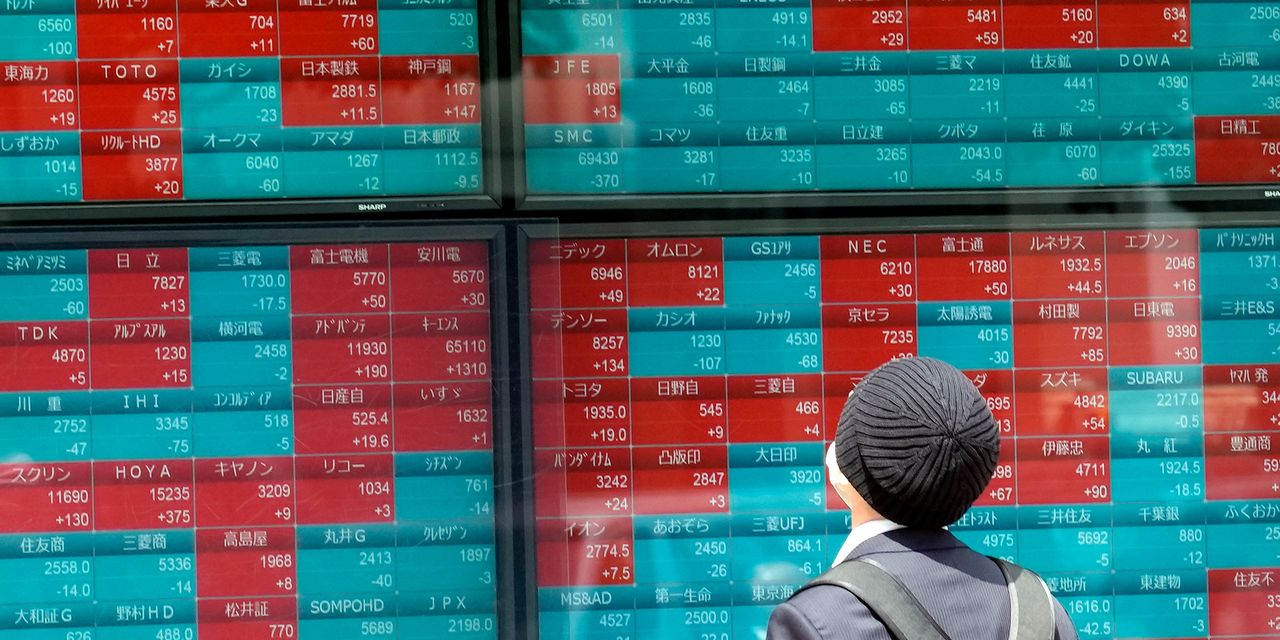TOKYO — Asian shares were mostly lower Friday on looming worries over U.S. banks and lagging demand from China, the region’s major driver of growth.
“Asian equities struggled for direction after weak inflation data in China pointed to weakening demand,” said Stephen Innes, managing partner at SPI Asset Management.
Recent data reflect very low inflation and weak credit extensions in China, which all indicate slowing growth as the initial jump from the nation dropping pandemic-related restrictions fades, he said.
Japan’s benchmark Nikkei 225
NIK,
gained 0.9% in morning trading as companies like Nissan Motor Co.
7201,
gained after reporting relatively favorable earnings. But SoftBank Group Corp
9984,
slumped after reporting its second year in a row of losses.
Australia’s S&P/ASX 200
XJO,
dipped 0.1% and South Korea’s Kospi
180721,
dropped 0.4%. Hong Kong’s Hang Seng
HSI,
was virtually unchanged, while the Shanghai Composite
SHCOMP,
lost 0.4%. Markets declined in Singapore
STI,
Taiwan
Y9999,
and Indonesia
JAKIDX,
A surprisingly sharp drop for The Walt Disney Co.
DIS,
after reporting it lost streaming subscribers last quarter dragged on shares on Wall Street.
The S&P 500
SPX,
lost 7.02 points, or 0.2%, to 4,130.62, with two out of every three stocks in the index falling. The Dow Jones Industrial Average
DJIA,
lost 221.82, or 0.7%, to 33,309.51, while the Nasdaq composite
COMP,
rose 22.07, or 0.2%, to 12,328.51.
Investors have been hunting for the next possible victim in the U.S. banking industry after high interest rates helped lead to three high-profile failures since March.
Helping to limit the losses for the overall market was a report showing U.S. inflation at the wholesale level was a bit cooler last month than economists expected. It followed a report from the prior day that showed inflation at the consumer level was also behaving largely as forecast.
The reports helped reaffirm expectations on Wall Street that the Federal Reserve will hold off on hiking interest rates again at its next meeting in June. That would be the first time that’s happened in more than a year.
A separate U.S. report said more workers filed for unemployment benefits last week than expected. That’s bad news for workers and adds to concerns about a potential recession because the job market has been one of the main pillars propping up the economy.
But a cooling labor market would also carry a benefit for the Fed, which fears that a too-hot job market could put upward pressure on inflation.
Following the reports, Treasury yields fell on expectations for a less-aggressive Fed. Traders are betting on a high probability that the Fed will have to cut interest rates later this year. Rate cuts act like steroids for financial markets but would likely happen only if the economy slides into recession and needs such oomph.
For banks, the broader concern is that the industry’s troubles may cause a pullback in lending, which would hurt the economy. The U.S. government is edging closer to a June 1 deadline where it could run out of cash unless Congress allows it to borrow more. Economists say a resulting default on the U.S. government’s debt could be catastrophic for the economy.
The yield on the 10-year Treasury fell to 3.39% from 3.44% late Wednesday. It helps set rates for mortgages and other important loans. The two-year Treasury yield, which moves more on expectations for the Fed, slipped to 3.90% from 3.91%.
In energy trading, benchmark U.S. crude
CLM23,
gained 30 cents to $71.17 a barrel. Brent crude
BRNN23,
the international standard, added 23 cents to $75.21 a barrel.
In currency trading, the U.S. dollar
USDJPY,
stood unchanged at 134.52 Japanese yen.
Read the full article here




